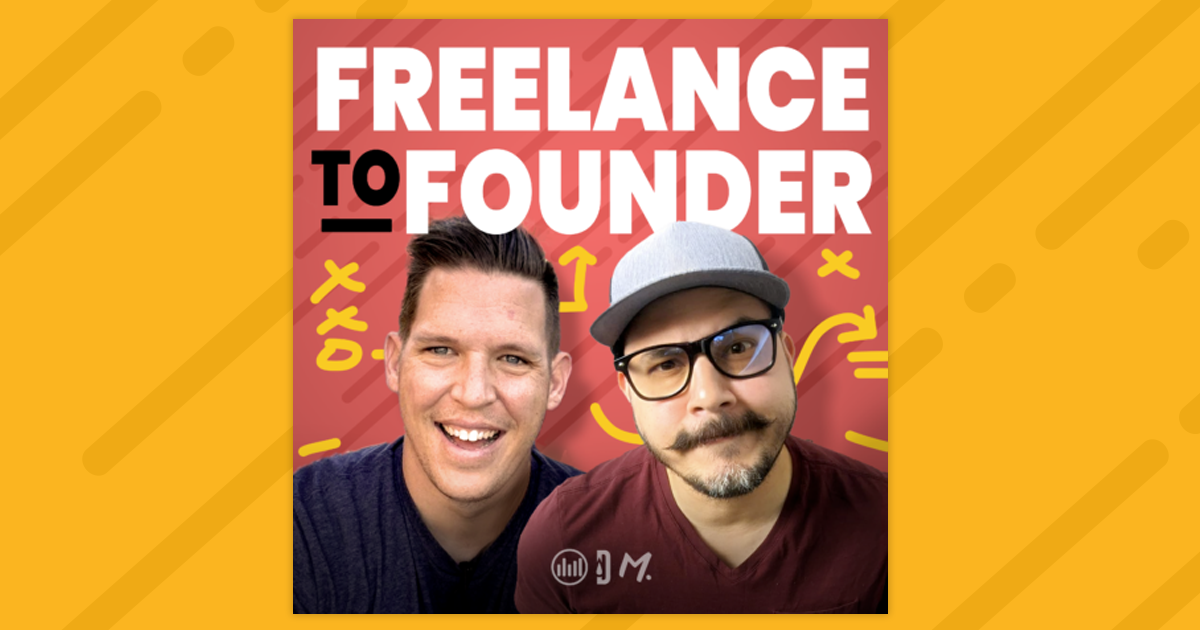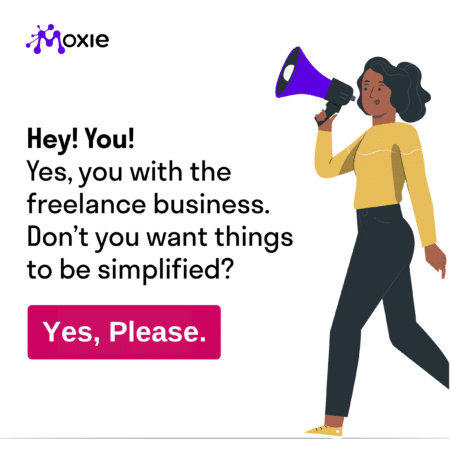Figuring out your pricing is one of the biggest struggles for new freelancers and solopreneurs. Do you charge hourly? By the project? What if a job takes less or more time than expected?
In this Q&A episode, we tackle a pricing question from listener Pennygoo about quoting an SEO optimization project.
Key Takeaways from this Episode:
- Never charge hourly. You get punished financially for working faster and more efficiently.
- Consider supply vs. demand. If demand is high and your availability is low, charge more.
- Price projects based on the value you provide, not hours worked. Assess the worth of solving the client’s problem.
- Appeal to emotions. Have a conversation to understand what’s at stake for the client if the problem remains unsolved.

The Pricing Dilemma
We received the following pricing question from a listener named Pennygoo:
“I’d like advice on how to price a freelance SEO job for WordPress. I’ve identified specific things that need to be changed, mostly optimizing their graphics. I imagine it would only take a few hours but I want to make sure I leave enough time in case I hit any snags.”
Right off the bat, we advise her to avoid charging hourly. It incentivizes you to work slower, punishing efficiency and expertise that allows you to complete projects faster. Your pricing says a lot about you and when you charge by the hour, you may seem like a commodity rather than an expert.
Consider Supply vs. Demand
If you move away from hourly billing, how should you price projects?
Clay notes it depends partly on your current demand vs. availability.
If potential clients are abundant but your calendar is mostly open, you can afford to charge less per project. But if you’re booked solid for months and turning away new business, you can justify higher rates.
This aligns pricing with the market dynamics between supply of your services and client demand. When demand is high and supply is constrained, increase your rates.
Price Based on the Value You Provide
But simply quoting flat project fees still overlooks a key factor – the value you provide.
Your rates should directly reflect the worth of the solution you’re offering. To illustrate this, I shared an example:

Let’s say Pennygoo is hired by a client whose website traffic has sunk from page one of Google to page two. This costs them $300,000 annually in lost revenue.
In this case, even if optimizing their site only takes 10 hours at $150/hour, that’s just $1500 total – far below the value provided.
When you make it possible for a client to gain or recover huge revenue, your fees should align proportionately. Resist undercharging.
Appeal to Emotion
This requires moving away from focusing on your hours and rates, and instead having a conversation about the client’s goals, pain points and what’s at stake for them.
Ask smart questions to quantify the negative revenue impact of their current problem. Then convey how you can eliminate that pain, and what it’s worth to them. Appeal to emotions – how would losing 30% of revenue affect their business and livelihood?
This frames your value in relation to the transformations they seek, not the time it takes. When they grasp the immense value you provide, high fees make sense.
Price Confidently
This value-based approach takes confidence and practice. But have faith that clients will happily pay rates aligned with the value you provide, even if it seems high compared to others.
Some may view this as manipulative sales tactics, but it simply reflects your worth. You’re enabling gains far exceeding your fees. The client is grateful, not resentful, when presented this way.

So have courage to not underprice yourself. If your expertise can solve $300k problems for $10k, that’s providing incredible value. Take pride in improving clients’ businesses and ask to be compensated accordingly.
You’ve got this.
Episode Transcript
This transcript was auto-generated and may have grammatical errors.
00:00.00
Preston Lee
Hey there and welcome to this Q&A episode of Freelance to Founder. As many of you may know we do these question and answer episodes each Tuesday and our full coaching sessions with freelancers just like you on Thursdays. So we’ll do a short one today and then we’ll catch you this coming Thursday with a full-length coaching episode. Joining me on the air today is Clay Mosley from GetTripify.com. Hey Clay, going well.
00:23.31
Clay

Man, it’s goin’.
00:31.14
Clay
But.
00:38.28
Preston Lee
I don’t know, my guess is that this is not this person’s real name. If it is, I’m sorry I laughed but it’s a, it’s like a cool branded name but I don’t think it’s a real name. This question, Clay, though comes from Pennygoo. Pennygoo, so you tell me, real name?
00:49.23
Clay
That could be. I mean, it depends on where this person’s from. I mean, there are names that might sound unusual to us.
00:57.10
Preston Lee
Let’s read the question here. It says: “I’d like advice on how to price a freelance SEO job for WordPress. I’ve identified specific things that need to be changed, mostly optimizing their graphics. I imagine it would only take a few hours but I want to make sure I leave enough time in case I hit any snags.”
So I think for me this is less about pricing SEO stuff. If you’re listening and you don’t do SEO, this I think is going to open an interesting conversation more about pricing.
01:47.24
Clay
Yeah, yeah, yeah, and really quickly, what’s the twenty second version of why we say don’t do hourly?
01:57.34
Preston Lee
You said you have thoughts. First, don’t charge by the hour. I think that’s pretty clear if you’ve ever watched or listened to our episodes. So many times we say don’t do hourly because as human beings, we relate hourly to cheap. Think about all the jobs in the world and who gets paid hourly and who gets paid salary. What’s the difference, right? You can put that together.
02:25.87
Clay
And for me, it’s also the piece of, you get punished for being better. If you get paid hourly, so if you’re faster, if you’re more efficient, you get punished because it takes you less time.
02:47.33
Preston Lee
Yeah, yeah. That’s true. The only, the only thing I hate though is that he justifies it. He’s like, “Well I went to college and learned where to hit it and I practiced in the field for 20 years and learned where to hit it,” whatever. For me, it’s like that stuff doesn’t matter. What matters is you pay, you agreed to pay me 50 grand to get your boat moving again. That’s what you care about, getting your boat moving.
03:16.97
Preston Lee
Yep yep. You get punished for being better if you get paid hourly.
03:26.10
Clay
Yes, well it reminds me of, there’s a meme or something on the internet where this big cruise ship is broken. You know what I’m talking about? Okay, so there’s a big ship, some sort of ship, big boat, that’s broken and the captain says we haven’t been able to fix it so we’re gonna hire you for, I remember the amount, but it was like $20,000 or whatever, 50,000, you can name it. Anyway, it’s a high price and the guy’s like “Okay, I could fix it.” It’s like 50 grand and the captain’s like “Okay great” and he literally, the mechanic, literally takes a hammer, hits it once and says “It’s fixed” and it was fixed. And the guy was like “Okay I’m not going to pay 50 grand for that.”
04:15.80
Preston Lee
Yeah, okay.
04:20.20
Clay
And the mechanic’s like “Well I spent 10 years learning where to hit the hammer right?” Even though it only took me one hit, it’s worth 50 grand, right? So if you charged hourly, you can’t really do that.
04:26.33
Preston Lee
Yeah.
04:32.82
Preston Lee
I love that story and I’ve heard all sorts of variations now that you explained it.
05:41.74
Clay
This is what doesn’t make sense with the legal industry, right? Like why would you pay a divorce attorney an hourly rate? They are incentivized to make sure your divorce gets drawn out, right? That doesn’t make any sense to me. Anyway, let’s move on.
05:56.59
Preston Lee
But you said you have thoughts. First, don’t charge by the hour. Do you have any other thoughts?
06:11.27
Clay
Yep. To be fair too, I also went on a tangent. Um, yeah I do. Project pricing. And I think this really depends on supply and demand. I mean how booked are you? Which is demand, right? And how much supply do you have, which is your time? If you have high demand and low supply, you should charge higher. If it’s the opposite, you should charge lower, in my opinion.
06:46.50
Preston Lee
Yep.
06:53.96
Preston Lee
For me this is also, we always have people saying, should I charge by the hour, by the project, and what that excludes is the option of charging by the value that you provide. Consider this is your client, right? And they have some sort of SEO job. Let’s consider just for illustration, the most extreme scenario. Okay, so let’s say this SEO job, all of their articles on their website that they use to generate new business for their company, all of their articles dropped to the second page of Google which no one ever goes to, right? Let’s say that’s the problem. Pennygoo is hired now to solve that problem. How much is that problem being solved worth to this company, even if she charges $150 an hour?
07:36.46
Clay
Yeah.
07:50.35
Preston Lee
If she can solve that problem in 10 hours, that’s only $1500. Depending on the company, that problem being solved is worth way more than that. You know what I mean? You have to sometimes step back and not even say by the project or by the hour. You have to say, what is this actually worth? It’s that whole idea of the ship moving. What is it worth to get this ship moving again, regardless of what it takes?
08:16.20
Clay
Yeah I think it’s a mindframe thing, right? It’s like the clients who look at costs based on duration, how long it’s going to take. I think those people generally have a hard time with business growth. It is a difference in mindframe. If I were talking to somebody about, let’s say, SEO services and they have a problem on the second page, they need to be on the first page, what does that work to them, right? So if I were talking to those people I wouldn’t ask them how many hours are you willing to pay? That’s a much different scenario versus “Hey if you could write a check right now and this problem could be solved tomorrow, what is that worth to you? What does that work to your business and your bottom line?” That’s a much different question because now it takes the time equation out. And now you can basically write your own check, in my opinion.
09:25.35
Preston Lee
Yeah, and that becomes an awkward question to ask, right? You have to figure out how to ask that question but in a different way, because it’s like when you go to buy furniture or a car, and they ask “Well what’s your budget?” You don’t want to tell them your budget because then they just find right up to your budget.
09:45.60
Clay
Yeah, yeah.
09:54.21
Preston Lee
The way you would ask this is like “How much revenue, if you had to guess, how much of your revenue comes from Google?” And let’s say “Oh well we do a million dollars in revenue a year. $300,000 of it is directly from Google.” And then at that point you can figure it out.
10:19.23
Clay
Yeah.
10:19.54
Preston Lee
Exactly. And you ask those questions amid lots of other questions you’re asking to learn more about their business. It’s not obvious you’re trying to determine numbers and pricing.
10:38.33
Preston Lee
And now because we’ve dropped to page two, we’re not getting that and it equates to, yeah, $300,000 a year or something. And then you’re tapping into that as a freelancer going, oh this is a $300,000 problem for them. To charge them $10,000 for this, if I can deliver on it, is nothing, right?
10:45.19
Clay
Yeah, yep.
10:53.66
Clay
Nothing, yeah, and it’s your job – this is good old sales training too – I’ve had tons of sales training and this is what you’re tapping into is the emotions. So I think you can even go further and ask the person, “Okay, this is a $300,000 problem potentially. What would happen if your business was reduced by $300,000 a year?” I would say it like that. “What would happen?” And then they can go into things like, “Well, we’d have to lay off employees or we might have to shut our business down.” Now you’re getting into emotions and then you can charge a really high ticket.
11:38.66
Preston Lee
Yeah.
11:49.55
Preston Lee
I think it’s important to understand that this isn’t manipulative or sleazy sales tactics. I think it’s understanding your value. When people say understand your value and charge what you’re worth, this is what they mean, right? Where if you can solve a $300,000 problem for $10,000, you’re providing a fantastic service. Nowhere else in business can you spend $10,000 and make $300,000. You just, it’s unheard of, right?
12:19.69
Clay
Yeah.
12:24.40
Preston Lee
It’s important to understand where you fall in that chain of revenue, new customers. This is easy for marketing spaces like SEO. Sometimes it can be harder, like if I’m a graphic designer and a client wants me for daily social media posts, it’s harder to justify. But that’s your job as a freelancer, as a salesperson, as a marketer, to get to the point where you can say this thing I’m offering is worth $5,000, $10,000, whatever you decide. You have to be bold and courageous in that way to give pricing like that.
13:07.10
Clay
Yeah.
13:14.30
Clay
I think it’s ironic because some people might think it’s sleazy, but I disagree. The client willing to pay $10,000 to fix a $300,000 problem, they don’t think it’s sleazy. They are happy to write that check. The people who do think it’s sleazy are usually people in your profession who charge a fraction of the price and they’re just pissed that they didn’t get the job, in my opinion. When I was doing websites, I was charging twelve, fifteen thousand dollars a website, for a pretty standard brochure website. You could find a freelancer to build the same thing for a thousand or less. The difference is, I have a brand name and trust factor and I’m good at sales. People value that.
14:22.26
Preston Lee
It’s about identifying what people value, right? Value-based pricing is the hardest to start with, but once you figure that out, it can really change your business and help you look at pricing in a whole new way. You’re right, the idea of a sleazy salesperson mostly comes from those of us on the sales side who are designers, writers, illustrators first, and then realize as a freelancer we have to do sales. We think sales is slimy. But if you’re adding value, yes that costs money, and people expect that.
15:05.80
Clay
Yeah.
15:12.97
Clay
Yeah.
15:17.26
Preston Lee
Hopefully Pennygoo, that was helpful. I’ve been Preston Lee from Millo.co and this has been a Q&A episode of Freelance to Founder. Thanks for listening, see you next time.
15:22.16
Clay
Cool.
15:35.86
Preston Lee
Thanks, Clay.
Keep the conversation going...
Over 10,000 of us are having daily conversations over in our free Facebook group and we'd love to see you there. Join us!

